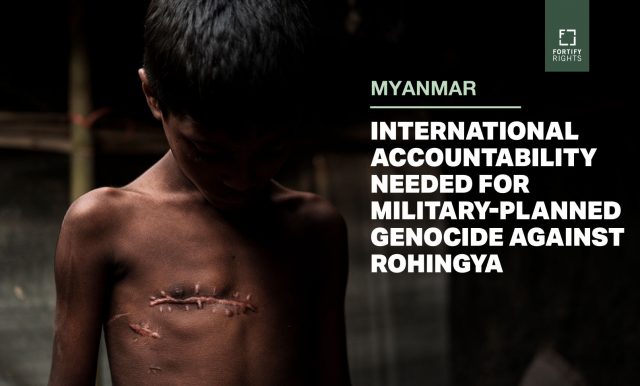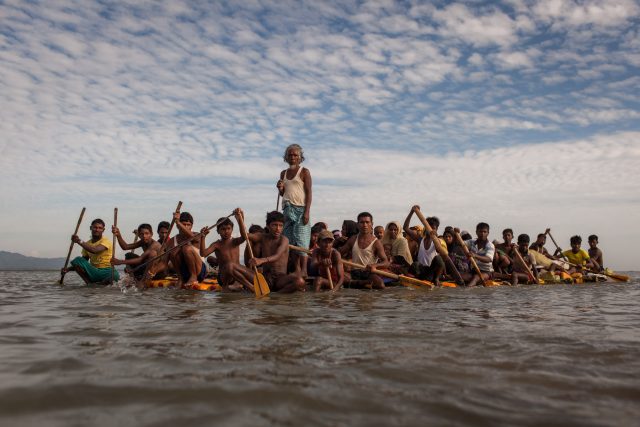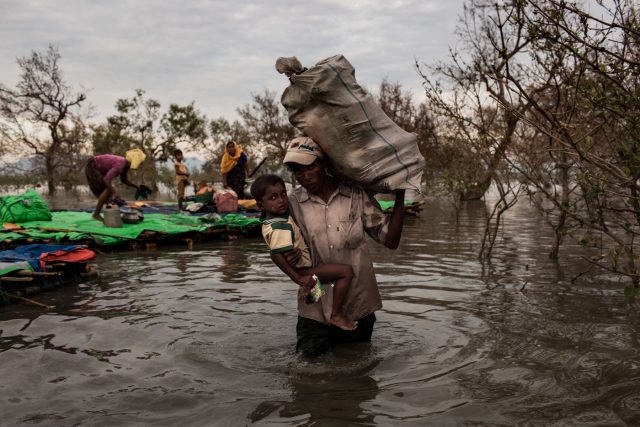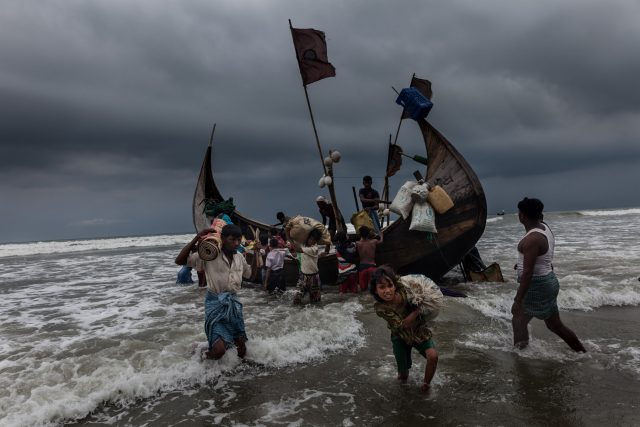Myanmar: International Accountability Needed for Military-Planned Genocide Against Rohingya

Report finds “reasonable grounds” for ICC arrest warrants, identifies 22 military and police officials

(BANGKOK and COX’S BAZAR, July 19, 2018)—The Myanmar authorities made “extensive and systematic preparations” for attacks against Rohingya civilians during the weeks and months before militants attacked police on August 25, 2017, Fortify Rights said in a new report released today. The report finds “reasonable grounds” that crimes against Rohingya constitute genocide and crimes against humanity, and it identifies 22 Myanmar Army and Police officials who should be criminally investigated for their roles in atrocities.
In order for the International Criminal Court (ICC) to issue an arrest warrant, the prosecutor must find “reasonable grounds” that perpetrators committed genocide and/or crimes against humanity. The report calls on the United Nations Security Council to urgently refer the situation in Myanmar to the ICC.
“Genocide doesn’t happen spontaneously,” said Matthew Smith, Chief Executive Officer at Fortify Rights. “Impunity for these crimes will pave the path for more violations and attacks in the future. The world can’t sit idly by and watch another genocide unfold, but right now, that’s exactly what’s happening.”
The dominant narrative about what occurred in Myanmar’s northern Rakhine State in 2017 suggests that Rohingya militants attacked dozens of police outposts, instigating a spontaneous Myanmar Army-led crackdown against Rohingya civilians, forcing the displacement of hundreds of thousands to Bangladesh.
The 160-page report, “They Gave Them Long Swords”: Preparations for Genocide and Crimes Against Humanity Against Rohingya Muslims in Rakhine State, Myanmar, documents how the Myanmar authorities committed mass killings, rape, and arson attacks against Rohingya in Maungdaw Township in October and November 2016. When the international community failed to effectively respond to these attacks, Myanmar authorities made preparations to commit another attack that extended throughout all three townships of northern Rakhine State—Maungdaw, Buthidaung, and Rathedaung.

Stranded on the Myanmar border with limited or no food and water for up to 20 days after fleeing Myanmar Army-led attacks, Rohingya refugees finally cross the Naf River on a makeshift raft made of bamboo and empty palm-oil cans—a five to seven-hour-long journey. Patrick Brown © Panos/UNICEF 2018
Specifically, Myanmar authorities: 1) systematically collected sharp or blunt objects from Rohingya civilians, “disarming” them; 2) trained and armed local non-Rohingya ethnic citizens in northern Rakhine State, preparing them for violence; 3) systematically tore down fencing and other structures around Rohingya homes, providing attackers with a greater line-of-sight on civilians; 4) deprived Rohingya civilians of food and other lifesaving aid, systematically weakening them physically ahead of attacks; 5) deployed unnecessarily high numbers of state-security forces to northern Rakhine State; and 6) committed human rights violations against Rohingya civilians, including imposing discriminatory curfews and other violations prior to attacks.
These deliberate actions fit within the United Nations’ Framework for Analysis of Atrocity Crimes as “preparatory actions” for genocide and crimes against humanity.
The report finds at least 27 Myanmar Army battalions, comprising up to 11,000 soldiers, along with at least three combat police battalions, comprising an estimated 900 police personnel, were involved in the attacks in northern Rakhine State beginning in August 2017.
Fortify Rights identifies 22 military and police officials with command responsibility for the “clearance operations” in northern Rakhine State. These officials should be criminally investigated and potentially prosecuted for genocide and crimes against humanity. The list includes Commander-in-Chief Senior General Min Aung Hlaing, Deputy Commander-in-Chief Vice Senior General Soe Win, and the Joint Chief of Staff of the Army, Navy, and Air Force General Mya Tun Oo.

Stranded on the Myanmar border for up to three weeks, Rohingya refugees cross the Naf River into Bangladesh—a five to seven-hour-long journey—on makeshift rafts made of bamboo, tarp, and empty palm-oil cans. Patrick Brown © Panos/UNICEF 2018
The report is based on a 21-month-long investigation, including 254 interviews conducted by Fortify Rights in Myanmar and Bangladesh with Rohingya eyewitnesses and survivors, Myanmar military and police personnel, Bangladesh military and government officials, members and former members of the Arakan Rohingya Salvation Army (ARSA)—also known as al Yaqin, a militant Rohingya group—international and local humanitarian aid workers, medical physicians, and others.
“They came and took all the knives away,” said “Rahana,” a 50-year-old Rohingya mother of two from Nyaung Chaung village in Buthidaung Township. “It was around two weeks ago,” she told Fortify Rights on August 30, 2017.
Myanmar authorities provided weapons—firearms and swords—and quasi-military training to non-Rohingya citizens in northern Rakhine State months and, in some cases, immediately prior to attacks on Rohingya that began on August 25, 2017.
“They gave them long swords,” said “Mohammed Rafiq,” a 25-year-old Rohingya eyewitness to a Myanmar Army-led massacre in Tula Toli—also known as Min Gyi—in Maungdaw Township on August 30, 2017. “I could see it. [The soldiers] handed [Rakhine civilians] swords. Even young Rakhine boys were given long swords, and they were moving around with the swords hanging on their backs.”
While disarming Rohingya and arming non-Rohingya in northern Rakhine State, the Myanmar authorities blocked humanitarian aid to Rohingya, including food and lifesaving aid. This had the effect of systematically weakening Rohingya civilians ahead of attacks against them.
The government also restricted access for journalists and human rights monitors before the attacks, including the Independent International Fact-Finding Mission, established in March 2017 by the United Nations Human Rights Council.
Fortify Rights interviewed several current and former members of ARSA who explained their involvement in hastily planned attacks on police outposts on August 25, which provided the ostensible spark for the Myanmar Army-led crackdown on civilians. Those interviewed by Fortify Rights described ARSA as having little to no military capacity and no training.
Upon ARSA’s assault on police outposts on August 25, Myanmar authorities activated local non-Rohingya citizens, some of whom they previously armed and trained. Together, they attacked Rohingya villages.
Fortify Rights documented how soldiers, police, and local non-Rohingya citizens hacked civilians, slit throats, and fatally shot and burned thousands of Rohingya men, women, and children in a matter of weeks. Soldiers raped masses of Rohingya women and girls, killed infant children, arbitrarily arrested men and boys, and destroyed several hundred villages in arson attacks, forcing more than 700,000 to flee to Bangladesh.
“Rashida,” 50, watched as Myanmar Army and Lon Htein (riot police) soldiers dragged her two adult sons from her home in Kha Maung Seik—also known as Fora Bazaar—in Maungdaw Township on August 27. “I was watching the whole time,” she told Fortify Rights just days after the incident. “The soldiers made them lay down on the ground, and then they cut their necks. We were shouting and crying.”
ARSA also perpetrated human rights abuses, including the murder of Rohingya civilians. Fortify Rights interviewed six members of ARSA, eyewitnesses to ARSA killings of Rohingya civilians, and 11 civilians who provided credible information that ARSA killed six Rohingya civilians in the lead-up to the August 25 attacks.
Rohingya survivors and members of ARSA told Fortify Rights that the militant group threatened, beat, and, in some cases, killed Rohingya they suspected of being government informants. Members of ARSA told Fortify Rights that Atta Ullah, the head of ARSA, issued the kill orders.
“Decades of persecution by the Myanmar Army doesn’t give Rohingya fighters a license to kill civilians,” said Matthew Smith. “Those responsible for these brutal killings should be investigated and prosecuted in line with international human rights standards.”

Noor Haba, 11, carries her family’s belongings to Shamlapur Beach in Bangladesh after the boat she traveled on from Maungdaw Township, Myanmar arrived safely at 8:43 a.m. Patrick Brown © Panos/UNICEF 2018
The report finds there are reasonable grounds to believe that the crimes perpetrated by the Myanmar Army, Police, and civilians against Rohingya in all three townships of northern Rakhine State constitute genocide.
The crime of genocide requires 1) the commission of one of five specified criminal acts 2) committed against a protected national, ethnic, racial, or religious group 3) with the intent to destroy the group in whole or part.
Specifically, the new report analyzes three acts of genocide—killings, causing serious bodily harm, and creating conditions of life designed to be destructive—committed with a specific intent to destroy the Rohingya in whole or in part. According to case law, genocidal intent can be inferred from a number of factors, including the political doctrine that gives rise to the acts, the use of derogatory language toward members of the targeted group, the scale of the atrocities, the systematic nature and atrociousness of the acts, the deliberate and systematic targeting of victims on account of their membership in a protected group, and the targeting of all members of the group.
The evidence collected by Fortify Rights demonstrates reasonable grounds to believe that the Myanmar Army, Police, and civilian perpetrators acted with genocidal intent to destroy the Rohingya in whole or in part.
The report also analyzes the commission of eight crimes against humanity—murder, extermination, rape, deportation or forcible transfer, torture, imprisonment, enforced disappearance, and persecution—committed by Myanmar Army soldiers and Police personnel against Rohingya civilians.
In addition to a U.N. Security Council referral to the ICC, the Association of Southeast Asian Nations (ASEAN)—to which Myanmar is a member—should hold an emergency meeting to develop a plan of action to address the Rohingya crisis and ensure international justice and accountability, Fortify Rights said.
“Rohingya communities know better than anyone that the authorities have been intent on destroying them for decades,” said Matthew Smith. “ASEAN has a particular role to play in ending these atrocities. Governments have the ability to persuade all members of the Security Council to support an ICC referral vote or at least abstain from blocking it.”
Read this original press release HERE.
Read about this report HERE.

